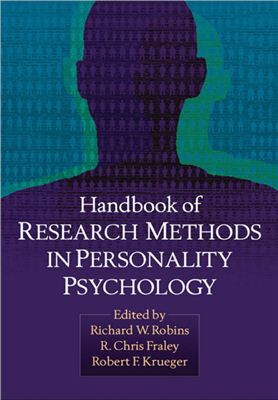2007 The Guilford Press
A Division of Guilford Publications, Inc.
72 Spring Street, New York, NY 10012
www.guilford.com
The idea for the Handbook of Research Methods in Personality Psychology came from the recognition that one of the most noteworthy strengths of the field—the diversity of its research methods—was not represented in a single volume that could serve as a guide for researchers interested in conducting personality research. Our goal was simple: To create a one-stop source that describes, in a straightforward and practical manner, all of the resources in the methodological toolkit of the personality psychologist. This volume includes overviews of classic topics, such as how to construct a personality scale, as well as more recent innovations, such as neuroimaging and molecular genetic techniques. Each chapter provides a general introduction to a particular method and then explains, in a step-by-step man ner, how the method can be used to address common research questions in the study of personality.
The book is divided into three sections, which collectively serve to guide the reader through all phases of conducting a personality study. The first section covers the various research designs used in the field, and helps readers determine the optimal type of study for addressing their particular research questions. The second section focuses on methods for assessing or measuring personality; chapters cover all of the most common methods used by personality researchers, as well as more recent but as yet less widely used methods. The third section covers the variety of procedures personality researchers use to analyze and interpret personality data; the chapters in this section help readers determine what to do with their data after they have conducted a personality study. This section also includes several chapters that address some methodological debates and challenges that are relevant to researchers in personality psychology and related fields.
A Division of Guilford Publications, Inc.
72 Spring Street, New York, NY 10012
www.guilford.com
The idea for the Handbook of Research Methods in Personality Psychology came from the recognition that one of the most noteworthy strengths of the field—the diversity of its research methods—was not represented in a single volume that could serve as a guide for researchers interested in conducting personality research. Our goal was simple: To create a one-stop source that describes, in a straightforward and practical manner, all of the resources in the methodological toolkit of the personality psychologist. This volume includes overviews of classic topics, such as how to construct a personality scale, as well as more recent innovations, such as neuroimaging and molecular genetic techniques. Each chapter provides a general introduction to a particular method and then explains, in a step-by-step man ner, how the method can be used to address common research questions in the study of personality.
The book is divided into three sections, which collectively serve to guide the reader through all phases of conducting a personality study. The first section covers the various research designs used in the field, and helps readers determine the optimal type of study for addressing their particular research questions. The second section focuses on methods for assessing or measuring personality; chapters cover all of the most common methods used by personality researchers, as well as more recent but as yet less widely used methods. The third section covers the variety of procedures personality researchers use to analyze and interpret personality data; the chapters in this section help readers determine what to do with their data after they have conducted a personality study. This section also includes several chapters that address some methodological debates and challenges that are relevant to researchers in personality psychology and related fields.

